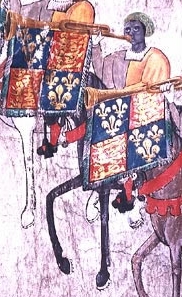British Black music
British Black music refers to music of the African diaspora, or music derived from the African diaspora which has been produced in Great Britain regardless of the ethnic background of the musicians.

Extract from the Westminster Tournament Roll probably showing John Blanke, a trumpeter of the 16th century.
Awards
Since 1996, an annual awards ceremony has been held for Music Of Black Origin, also known as the MOBO awards.[1]
Genres
- 2-step garage
- Afroswing
- Bassline
- British black gospel
- British blues
- British hip hop
- British jazz
- British soul
- Dubstep
- Grime
- Oldschool jungle
- Ragga jungle
- Trip hop
- UK garage
- UK funky
- UK Gospel
- UK Drill
Organisations and events
- African Society of Literati, Musicians, and Artists (established in 1897)
- Music Of Black Origin Awards
- Urban Music Seminar
- Black Music Awards (BMA)
Notable contributors to British Black Music
16th century
18th century
- Ignatius Sancho
- George Bridgetower
- Joseph Emidy
- Fisk Jubilee Singers
Early 20th century,
Late 20th Century
- The Real Thing
- Aswad
- Loose Ends (band)
- Junior Giscombe
- Maxi Priest
- Five Star
- Heatwave (band)
- Imagination
- Sade
- Soul II Soul
- Mica Paris
- Gabrielle
- Shola Ama
- D'Influence
- Beverley Knight
- The Specials
- Amazulu (band)
- Omar
- Lynden David Hall
- Skin (Skunk Anansie)
- A Guy Called Gerald
Early 21st century
- Wiley
- So Solid Crew
- Dizzee Rascal
- Ghetts
- Jammer
- Lethal Bizzle
- Skepta
- Kano
- Stormzy
- FKA Twigs
- Sampha
- Michael Kiwanuka
- Little Simz
- Raleigh Ritchie
gollark: The hardest one I ever did was the British Informatics Olympiad, which was intensely ae ae ae ae
gollark: Just constantly modulusize it after all operations?
gollark: ↑ palaiologos, if they were a frog, which I do not think they are
gollark: https://media.discordapp.net/attachments/900279248537915392/900461557799075900/image.png
gollark: Kit, EMIT taus (particle).
See also
- Black British
- Caribbean music in the United Kingdom
- Music of Africa
- British Black Gospel
References
- Horan, Tom (25 September 2003). "MUSIC: How Ms MOBO proved them wrong". Daily Telegraph. London.
Further reading
- Cotgrove, Mark (2009). From Jazz Funk & Fusion to Acid Jazz. Milton Keynes: AuthorHouse. ISBN 978-1438973609.
- Dabydeen, David; Gilmore, John; Jones, Cecily (2008). The Oxford Companion to Black British History. Oxford: Oxford University Press. ISBN 978-0199238941.
- de Koningh, Michael; Griffiths, Marc (2003). Tighten up!: The History of Reggae in the UK. London: Sanctury.
- fryer, Peter (1984). Staying Power: The History of Black People in Britain. London: Pluto.
- McGrady, Richard (1991). Music and Musicians in Early Nineteenth Century Cornwall: World of Joseph Emidy - Slave, Violinist and Composer. Exeter: University of Exeter Press.
- Oliver, Paul (1990). Black Music in Britain: Essays on the Afro-Asian Contribution to Popular Music. Buckingham: Open University Press.
- Owusu, Kwesi (2000). Black British Culture and Society: A Text Reader. London: Comedia.
- Portelli, Tony (2006). The Music Industry Raw: Pirates, Clubs, House and Garage. Milton Keynes: AuthorHouse.
- Smith, Steve Alexander (2009). British Black Gospel: The Foundations of This Vibrant UK Sound. Oxford: Monarch Books. ISBN 978-1854248961.
- Simons Andrew. Black British Swing: The African Diaspora's Contribution to England's Own Jazz of the 1930s and 1940s. Northway Publications.
- Schwartz, Roberta Freund (2007). How Britain Got the Blues: The Transmission and Reception of American Blues Style in the United Kingdom. Aldershot: Ashgate.
This article is issued from Wikipedia. The text is licensed under Creative Commons - Attribution - Sharealike. Additional terms may apply for the media files.